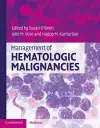
Management of Hematologic Malignancies
3 contributors - Hardback
£182.00
Stefan H. Faderl, MD, graduated in 1990 from Ludwig-Maximilians University in Munich, Germany. After fellowship training in Medical Oncology at the MD Anderson Cancer Center, Dr. Faderl joined the Leukemia Department at MD Anderson Cancer Center, where he worked on acute and chronic leukemias and rose to the rank of full professor. During this time he was engaged in the development of several new agents for the treatment of leukemia. In 2013, Dr. Faderl took the position as Chief of Leukemia at the John Theurer Cancer Center at Hackensack University Medical Center, where he successfully grew the clinical and clinical research programs. In 2017 he transitioned to the pharmaceutical industry where he continues developmental work towards new therapies for oncology patients. Dr. Faderl is the author of numerous journal articles, book chapters, abstracts, and editorials.
Hagop M. Kantarjian, MD, is a professor and chair of the Department of Leukemia at The University of Texas MD Anderson Cancer Center in Houston, TX. Also, he is the Samsung Distinguished Leukemia Chair in Cancer Medicine and a Special Fellow on Healthcare Policies at the Rice University Baker Institute in Houston, TX and and advocates for healthcare issues pertinent to patients with cancer and leukemia.Dr Kantarjian’s research focuses on translational-clinical developmental therapeutics in leukemia. In the past 3 decades, he has made several contributions that improved the prognosis and survival in patients with chronic myeloid leukemia (tyrosine kinase inhibitors, eg, imatinib, dasatinib, nilotinib, bosutinib, ponatinib which improved the 10-year survival from 20% to 90%), in acute lymphocytic leukemia (H-CVAD regimen and its derivatives; antibodies including blinatumomab and inotuzumab), the discovery of decitabine for the treatment of myelodysplastic syndrome, and of clofarabine for the treatment of leukemias, among others. His research and collaborations were the basis for the FDA approvals of several drugs in leukemia.
Elihu Estey, MD, has been involved in clinical research in acute myeloid leukemia (AML) for almost 40 years, the first 30 at MD Anderson Cancer Center in Houston, and the past 9 at the University of Washington Medical Center and the Fred Hutchinson Cancer Research Center, Seattle (UW/FHRCH). While at MD Anderson he was the first to report use of all-trans retinoic acid and arsenic trioxide without cytotoxic chemotherapy for treatment of newly diagnosed acute promyelocytic leukemia, which is now the standard worldwide. He also implemented a selection design for comparing new therapies in AML, which formed the basis for the “play-the-winner” designs used in trials in older patients. At UW/FHCRC he suggested the feasibility of early discharge from hospital after intensive induction therapy for AML. Dr. Estey coordinates UW/FHCRC non-transplant AML clinical research and has made major contributions to the development of the European LeukemiaNet AML guidelines and before that the International Working Group AML Guidelines. He regularly publishes in Blood, JCO, and Leukemia and in 2016 wrote an NEJM editorial on therapeutic implications of AML molecular subtypes.